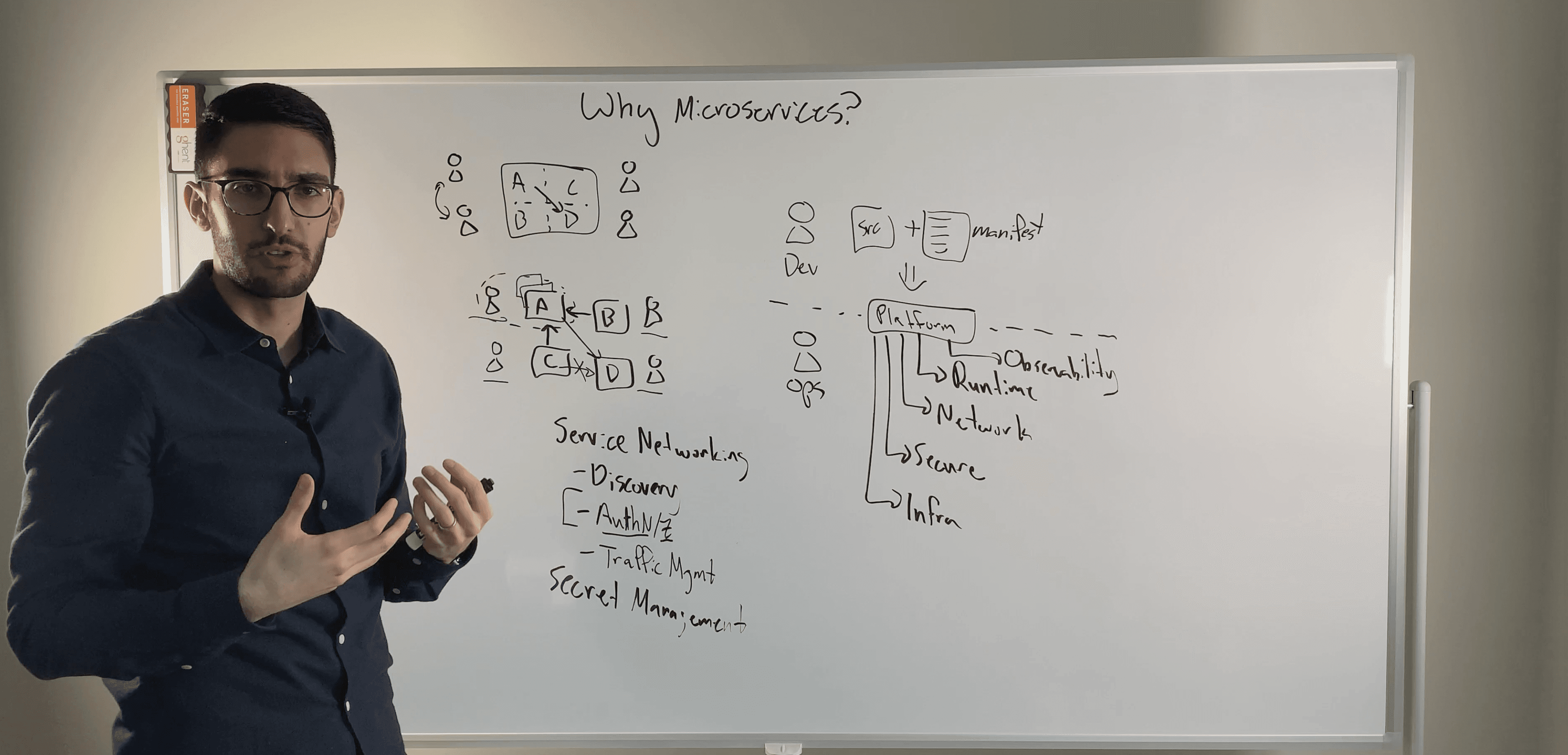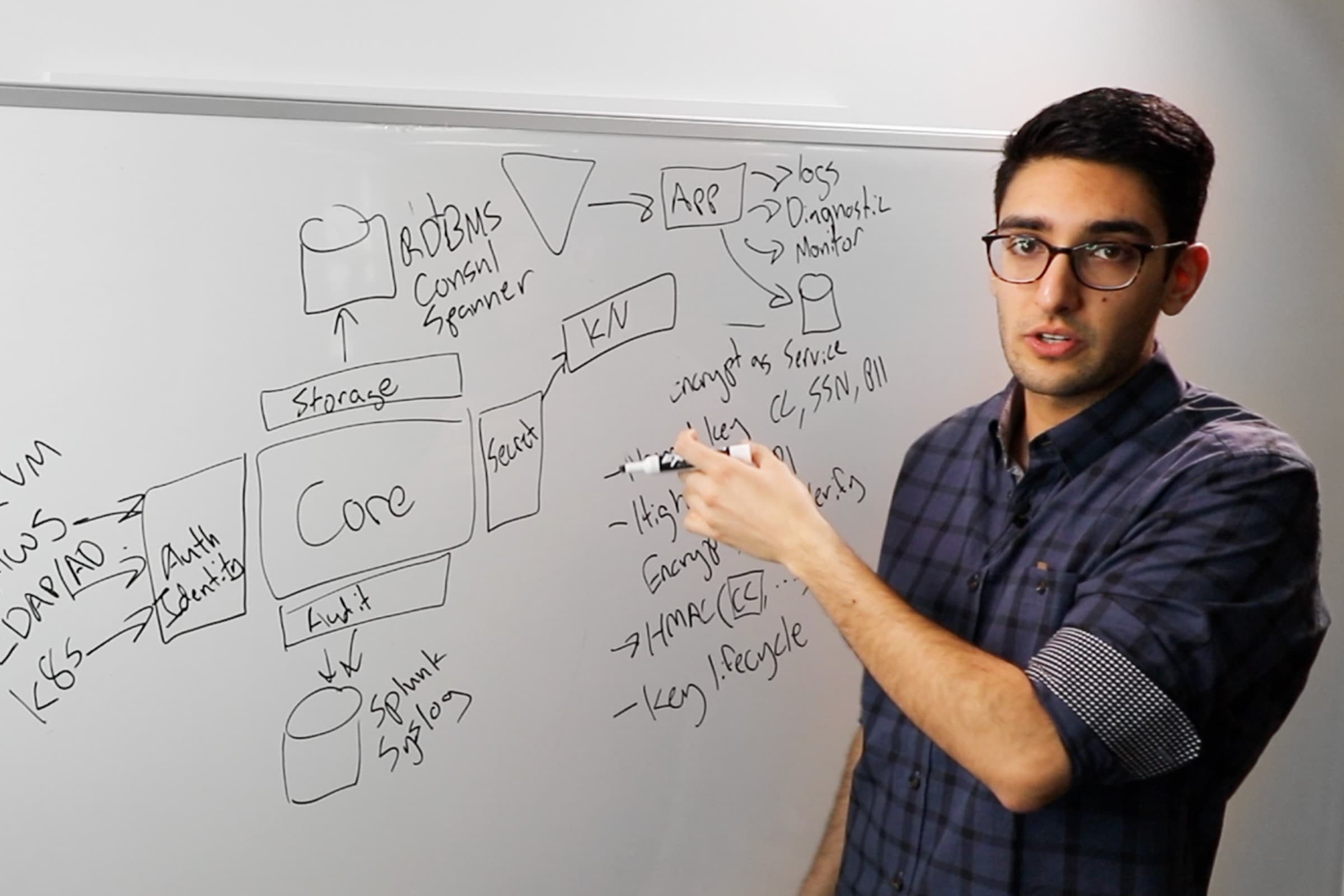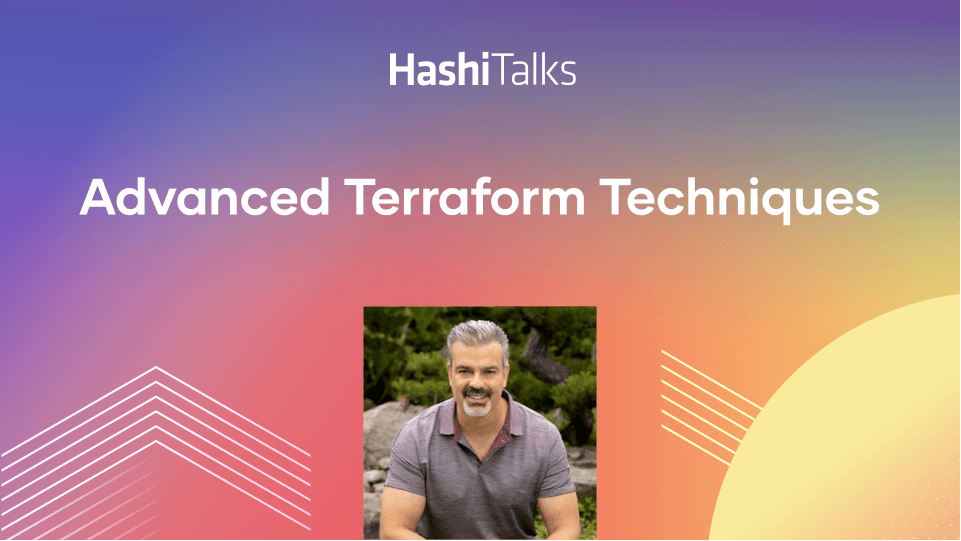HashiConf Panel: Certifications Q&A
Watch Bryan Krausen and Ned Bellavance questions about the Terraform Associate and Vault Associate exams in this live panel from HashiConf Digital June.
Join us for a panel discussion around HashiCorp Certifications with Ambassadors Bryan Krausen from AHEAD and Ned Bellavance of Ned In the Cloud.
Transcript
Rob Barnes: So now, we're going to shift to something a little bit different now. We're going to have a live Q and A discussion panel, but this time, we're going to talk about the HashiCorp certifications.
Rob Barnes: And for that live Q and A panel, we are going to be joined by newly appointed HashiCorp ambassadors for 2020, Bryan Krausen, and Ned Bellavance. Thank you very much for joining us, and with that, I'm going to hand over to Dominique to kick us off with this discussion.
Dominique Top: Thank you. And I also wanted to point out that our very own DevOps' Rob has been assigned and appointed as DevOps' ambassador. So all three of you, congratulations on that one.
Dominique Top: So let's just kick us off right away. Could you tell me a bit more about the value of HashiCorp certification? Why should you pursue it? And I would like to ask that to Bryan first.
Bryan Krausen: Absolutely. So thank you for hosting this. Yeah, so the value, I mean, is that HashiCorp products in general are really becoming a staple in the majority of enterprises today.
Bryan Krausen: Many enterprises are starting to focus a lot of their efforts around using Terraform to deploy their applications and infrastructure, especially when we're talking about moving to public cloud, along with using things like Consul to Connect services, and then using Vault to secure those services as well.
Bryan Krausen: So as these products are really ingrained in the process of enterprises today, it's becoming more and more critical that enterprise administrators and engineers really understand these products. And by taking certifications, that allows potential employers and employees to prove that they understand the technologies.
Dominique Top: Yeah, amazing. Ned, what about you?
Ned Bellavance: I would just add on top of that is, for me, certifications have often been a way to learn a particular product, because it gives me a guideline on what's important about that product and a roadmap for learning it.
Ned Bellavance: So when I'm approaching a new piece of technology, if there's a certification out there, that can really help me learn and dive into the product in a way that is going to be beneficial to me. So I think it's not only making yourself more employable, but just finding a way to learn the product in a way that makes sense.
Dominique Top: Yeah, agreed. I've found the same. So onto the next question. I think Bryan touched on that a little bit, but what exams are available right now and what do they look like?
Ned Bellavance: Sure.
Dominique Top: Bryan, you-
Ned Bellavance: I'll take-
Dominique Top: ... want to carry on?
Ned Bellavance: ... that one. So there are two certifications currently available. There's the Terraform Certified Associate and the Vault Certified Associate. Both of the exams are online only, and really, that's the only option right now anyway.
Ned Bellavance: And they are a multiple-choice style exam, and they're really targeted at the associate level, so you're expected to have a beginner level of knowledge or associate level of knowledge with the product. You're not expected to be an expert in how to deploy this in production across thousands of nodes, or anything like that. They're really going for that associate level first, and then building on top of that certification for something at more, maybe at the professional level.
Dominique Top: Great, great. Amazing. Well, Rob, do we have any questions coming in for the gentlemen on the panel?
Rob Barnes: Not at the moment, no. But I will encourage everyone, if you have any questions, please do ask them just below me on the platform, and I will do my best to get Bryan on there to answer them live on air for you. So please do get involved in the conversation. There's a lot of value that's being explained with the HashiCorp certification, so if you're curious...
Rob Barnes: Oh, and just as I've said that, one's come in. So it says, "Do you plan to offer different levels of certification, for example, beyond associate level?" which is a great question. I'll give that one to Bryan, seeing as Ned spoke last.
Bryan Krausen: Sure, thanks. So yeah, while Ned nor I work directly for HashiCorp or the certification team, I've had discussions with some of the team that I think the future offerings may look like associate, and then maybe move up to advanced and maybe professional, or some level of that. But again, I think that's completely up to the certification team at HashiCorp.
Bryan Krausen: But I have heard rumblings of something else coming into play. The advanced certifications, if that's what they decide to call them, I've heard is going to be more on the VMware type when you go to the VCAP, where it's going to be more of a live environment where you go in and actually make changes to the environment instead of just answering multiple-choice questions. So again, that's just what I've heard, rumblings from HashiCorp employees. Things might change, so take that with a grain of salt here.
Rob Barnes: Brilliant. Thank you very much. Those are our leaks there. Right, so these questions are... They're like London buses. You can't get one, or all of a sudden, three or four of them show up, right? So we have more questions.
Rob Barnes: So the second one we have is, when will we see more advanced... Oh yeah, here we go. When will we see more advanced certifications for Vault and Terraform? which I think you've answered that one there in your last response, Bryan.
Rob Barnes: So move on to the next one is, will the exams get also later, a hands-on version, which they will... or will they stay multiple-choice? Again, I think you touched on that, but I don't know if you want to elaborate a bit more on what you think it might be.
Bryan Krausen: Yeah. I mean, the only thing I will say is, on the associate test right now, especially for Vault, there are, I wouldn't say necessarily say, "Hands-on," meaning you're in an environment and making changes. But on the Vault exam, there are multiple-choice, multiple select, and a fill in the answer, right? So it's asking what a specific command is, or something like that. And it's literally a text box and you would just type in the command there.
Bryan Krausen: So again, not necessarily an environment, but you get some of that experience, I guess. You have to understand what the commands are in the associate exam. I didn't have any personally, on the Terraform exam like that. Most of mine were multiple-choice or multiple select.
Rob Barnes: Amazing. Thank you very much, Bryan. And we have one final question, which is, are there any books in the works for exam prep? So I'll give that one to Ned.
Ned Bellavance: So I don't know. Am I allowed to plug myself here? Sorry. I did write a guide with Adin Ermie, and it's available on Leanpub, if you just search Terraform certified. So that is available. It's not an official guide from HashiCorp, so I just want to put that disclaimer out there. But it is something that Adin and I compiled, and we're both pretty knowledgeable about Terraform, so I think that's one option for you.
Ned Bellavance: Also, I really want to plug the Learn track that's available on HashiCorp's website. They have just put together a fantastic set of learning activities and a great study guide on there. So if you want to know what are the objectives for the exam, those are really, really well laid out, and they're true to the questions. There's not a whole lot of... There's no gotchas, I should say. The objectives really map to the things you need to know.
Ned Bellavance: And then, the study guide and the learning activities take you through the process of doing those things, so that's a great starting point. And then, of course, there's some guides out there. And I believe, Bryan, you have some material as well, if someone's trying to prepare for either the Vault or the Terraform certification, correct?
Bryan Krausen: Yep. Yeah, that's correct. So I have two online training courses specifically for Vault, that I know a lot of people have used to successfully pass the Vault exam, along with practice questions as well. So the idea behind those was not, obviously, to just go and memorize those things, right? The idea was to go challenge you and make sure you understand all the aspects of the topics that are going to be covered during the exam. And so you can figure out areas where you're weak, and focus on those as well.
Bryan Krausen: I will say, from a book perspective, I know that there is an existing... There's a HashiCorp employee right now writing more of an intro to Vault book right now. And then, I am personally also co-authoring a much larger book. It's called Running HashiCorp Vault, in production right now, with a HashiCorp employee right now. That's still to be determined. We're working on that. I'm not sure when that's going to come out. We're expecting that to be pretty big.
Bryan Krausen: But yeah, tons of resources out there. I'll echo what Ned said, in regards to the learn track. Very good. That's where I used to study for the Terraform exam. I'm much stronger involved in Consul than I am in Terraform, so I focus on the learn track. And again, as Ned said, it's perfectly laid out. If you understand all the material on the learn track, then you'll be set for the exam.
Ned Bellavance: Right, and I would just-
Rob Barnes: Amazing. Thank you very much.
Ned Bellavance: ... add on top of that, there is no replacement for keyboard time. So really, go through the exercises, but then just try things out. Fortunately, Vault and Terraform, they're both open source and free, and you can spin up resources without spending any money. So get that keyboard time in, and really just try different things out, try to break things and then fix things. And that will really help you learn the product much more than reading a book or watching a video is going to help you.
Rob Barnes: Definitely have to agree with that there. So we have more buses, aka, questions, that have come through. So the next one is, do you have any timeline when the Nomad associate will be expected? So let's give that one to Ned.
Ned Bellavance: Sure, so like Bryan said, we don't work for HashiCorp. We interact with the teams that are working on this. But I believe that the current priority, and feel free to correct me if I'm wrong, I believe the current priority is to do a Consul exam next, a Consul certification exam. And then, Nomad will be the fourth in that series. So I think that is the priority they're going for. I'm not sure how far things are along in the pipeline, but I would expect to see the Consul certification and exam come out prior to the Nomad.
Bryan Krausen: Agreed. So if you go to the, I think it's hashicorp.com/certification, you can actually see. So that's your main site where you would go for information on HashiCorp certifications, and you can see that they have the Consul exam. They have the objectives laid out, and it clears... Coming soon, right? But they don't have anything yet for Nomad yet. So yeah, I expect that to come directly after Consul.
Rob Barnes: Thank you very much. All right, you heard it first. Watch your space when it comes to Nomad.
Rob Barnes: So we have another question, which I'll throw to Bryan, which is, will associate level certification be required in order to get higher levels?
Bryan Krausen: That, I am not sure of. Again, I don't want to continue echoing it. That's completely up to the certification team.
Bryan Krausen: I imagine it will be considered that the majority of the vendor's manufacturers who create these certification tests, they usually generate... will require the lower level certification before you can move up, similar to AWS. Oh, I think AWS may have changed theirs, but you used to have the associate, and then move up to the professional level. But yeah, I assume it will, but again, that's up to Lisa and the certification team.
Rob Barnes: Brilliant. Thank you very much. I have lots more questions, but I'm going to ask one more, then I'm going to throw it back to Dominique, because I think she has a question about the costs. So the question I have is, how do you recommend preparing for the existing exams? So I think you've touched on this before, but maybe add a bit more context. So we'll give that one to Ned.
Ned Bellavance: Sure. I would recommend starting with looking at the exam objectives. That's going to be the most important piece, is understanding, what am I actually going to be tested on?
Ned Bellavance: And the exam objectives are broken into high-level objectives, and then sub-objectives or enabling objectives. And that's really useful to understand, okay, at a high level, how strong am I in this particular high-level objective, and then look at the sub-objectives and go, okay, I don't really know much about Terraform modules, or something, so I need to delve more into the world of Terraform modules.
Ned Bellavance: So if you already have some level of experience, that's a good checklist. Okay, I know these things. I'm weak on this other thing. When I was studying for Vault, I didn't know the transit secret engine very well. And that seemed to be an important component, so I was like, "Ooh, I'd better bulk up on that, get some keyboard time." So that would be my first stop, is that objective list.
Ned Bellavance: And then beyond that, the Learn site is an absolute invaluable resource, and getting keyboard time in to learn whatever you think your weak points are when it comes to the product.
Rob Barnes: Brilliant. Thank you very, very much. [crosstalk 00:13:47] back-
Bryan Krausen: Agreed. I'll-
Rob Barnes: ... to you, then.
Bryan Krausen: ... add on that real quick that the, yeah, the Learn site, HashiCorp does a phenomenal job. Actually, I don't know of any other vendor who does this, but if you go to the Learn site, they have all the objectives broken out and they give you the links to the actual material on their documentation. So I mean, it's super, super simple. Follow that study guide, follow the links, understand all the material on those links, and again, I think you'll be fine with the exam.
Dominique Top: I mean, that's just another great example that HashiCorp cares about workflows, right?
Bryan Krausen: Agreed.
Dominique Top: I have, indeed, one more question. How much does it cost?
Ned Bellavance: In terms of certifications, I think this one's pretty inexpensive. It's $70 and 50 cents U.S. I'm not sure what that converts everywhere else. But when I saw the price, I was like, "Oh, wow. That is not very expensive when I know how much some other exams have cost in the past." So for me, that was another high point of this certification program.
Dominique Top: Amazing. So now, I'm not sure if you saw that earlier, but I would like to take a selfie with you before... Thank you. So look at the screen and smile. Bryan, Ned, thank you so much for joining us today. And yeah, we'll be onto the next one.


